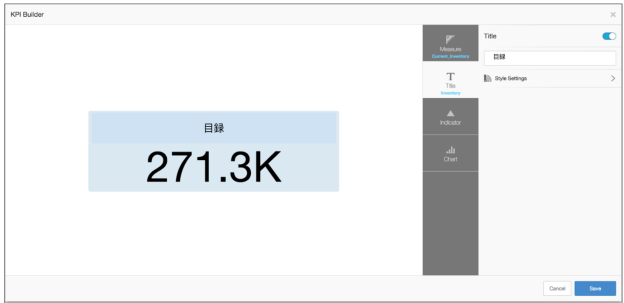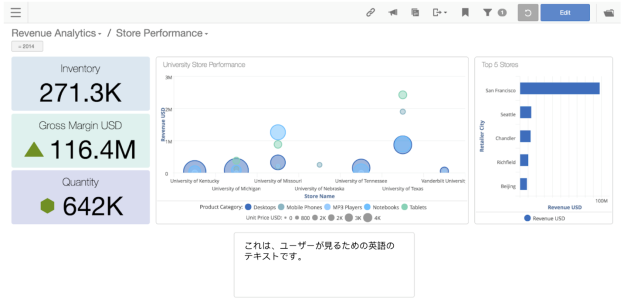User Created Translations
If you are using Birst in a multi-lingual environment, certain elements can be translated to each user’s own language to better support localization. Localization allows users to build off of the existing translation capabilities in Birst. See Localization and Business Translation for additional information.
Localization is managed in Admin using a localization file that can be uploaded in the interface to translate user create content.
The table header in this table uses the same column headers from the localization file. The rows show the possible value types and their format for the translatable content or element.
|
Category |
Subcategory |
Property |
Path Name |
'path' |
Corresponding 'id' column value / type |
Description |
|---|---|---|---|---|---|---|
| Visualizer | Column | Label | Catalog folder\...\Report Name | <name>.viz.dashlet | Column alias | Visualizer reports are populated based on the expression used to define it. Expressions will contain the column alias, which when translated will affect all references to the column alias in the visualizer report. This affects custom column labels in a visualizer report. |
| Designer | Element | Label | <name>.AdhocReport | Text | Designer reports are populated based on the expression used to define it. Expressions will contain the column alias, which when translated will affect all references to the column alias in the designer report. This affects custom labels in a designer report. | |
| Report catalog | File Folder | Name | \Catalog folder\...\File or Folder Name | catalog | either a relative path to folder or file | The set of file folders that are in the shared folder of a catalog. Translating these items affects their display in the file browser component of the application. |
| Report catalog | Collection | Name | \Catalog folder\...\Collection Name | dashboard-collections | id | The set of translatable page names in a dashboard collection. |
| Report catalog | Dashboard | Name | Catalog folder\...\Dashboard Name | dashboards/{uuid}/pages/{uuid | The name of the dashboard. | |
| Dashboard | Button, KPI, Reports dashlet, Text, HTML, Embedded filter dashlet, Web Page dashlet | Description, Text, Dashlet Title, Title. | uuid of element in PAGE | The translatable elements in a dashboard page configuration. These include buttons, kpi, report dashlets, text, HTML. | ||
| Dashboard | Filter, Filter Group, Native Filter, Native filter Group | Name | filter | filters | uuid | Names of prompts. |
| Subject Area | Saved Expression | Name | N/A | subject-area | SavedExpression('name of expression)' | The elements in a single subject area. The specific items that are subject to translation are saved expressions. |
| Subject Area | Main | Name | N/A | subject-area | Name of the subject area | Elements that are translated in this area specifically relate to the global set of subject areas. The items that are normally translated are subject area names. |
| Subject Area | Global Filter | Name | N/A | Global-filters | uuid | Elements that are translated in this area specifically relate to the global set of subject areas. The items that are normally translated are subject area names. |
| Subject Area | Custom Set | Name | N/A | Custom-sets | uuid | Elements that are translated in this area specifically relate to the global set of subject areas. The items that are normally translated are subject area names. |
This table shows the available locales supported by Birst:
|
Country Name |
Language |
Locale Code |
|---|---|---|
|
Argentina |
Spanish |
es_AR |
|
Australia |
English |
en_AU |
|
Austria |
German |
de_AT |
|
Belgium |
French |
fr_BE |
|
Belgium |
Dutch |
nl_BE |
|
Belize |
English |
en_BZ |
|
Italy |
Italian |
it_IT |
|
Saudi Arabia |
Arabic |
ar_SA |
|
Brazil |
Portuguese |
pt_BR |
|
Canada |
English |
en_CA |
|
Canada |
French |
fr_CA |
|
Chile |
Spanish |
es_CL |
|
China |
Chinese |
zh_CN |
|
Croatia |
Croatian |
hr_HR |
|
Czech Republic |
Czech |
cs_CZ |
|
Denmark |
Danish |
da_DK |
|
France |
French |
fr_FR |
|
Germany |
German |
de_DE |
|
Hungary |
Hungarian |
hu_HU |
|
India |
English |
en_IN |
|
Ireland |
English |
en_IE |
|
Jamaica |
English |
en_JM |
|
Japan |
Japanese |
ja_JP |
|
Korea |
Korean |
ko_KR |
|
Luxembourg |
German |
de_LU |
|
Luxembourg |
French |
fr_LU |
|
Mexico |
Spanish |
es_MX |
|
Netherlands |
Dutch |
nl_NL |
|
New Zealand |
English |
en_NZ |
|
Philippines |
English |
en_PH |
|
Poland |
Polish |
pl_PL |
|
Portugal |
Portuguese |
pt_PT |
|
Serbia |
Serbian |
sr_Cy |
|
Singapore |
Chinese |
zh_SG |
|
Slovakia |
Slovakian |
sk_SK |
|
Slovenia |
Slovenian |
sl_SI |
|
South Africa |
English |
en_ZA |
|
Spain |
Spanish |
es_ES |
|
Sweden |
Swedish |
sv_SE |
|
Switzerland |
German |
de_CH |
|
Switzerland |
French |
fr_CH |
|
Trinidad |
English |
en_TT |
|
United Kingdom |
English |
en_GB |
|
United States |
English |
en_US |
|
United States |
Spanish |
es_US |
|
Venezuela |
Spanish |
es_VE |
Birst users can select their own locale via Language option in the User settings. See Language Locales for more information and for more locale options.

When a user sets their language, the language is present in the translation file, then users will see the content in their language of choice.


If a user selects a language that is not present in the localization file, the translation from the file’s ‘default’ column will display.
Note: If a space with a localization file is copied, the localization file is copied as well.